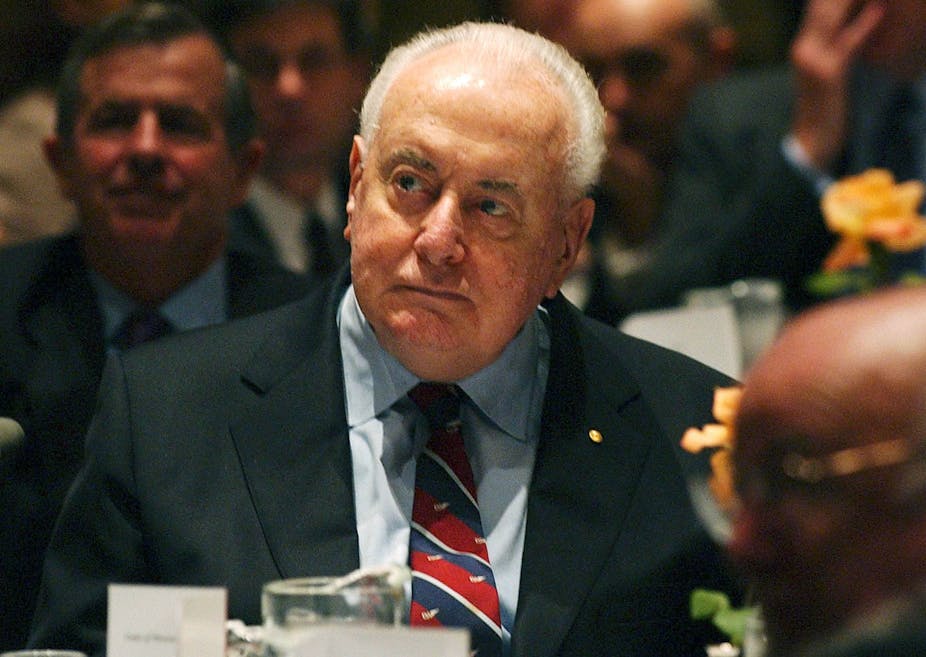The greatest tribute that can be paid to Gough Whitlam is the fact that he is so fondly remembered by so many. The affection for Whitlam is contagious for those who admired the vision he had for Australia and the social charter of his government.
One of the hallmarks of his term of office in the 1970s was that he embraced a social contract over economic management. The idea that, for the first time, Australians lived in a society rather than an economy was borne out of the inclusive nature of Whitlam’s policies in health, education, Indigenous affairs, family law reform, poverty, urban development and moral improvement in general.
The undoing of a class-based system of social distinction was secured during a very short time in office, and established a recognition that it was possible to reinvent Australia and Australian identity.
Across the political spectrum, a truth in common to all is that the Whitlam government was remarkably radical. Having been in opposition for 23 years, the “It’s Time” arrival of Labor in Canberra was cathartic in delivering “aspirations which touched the hearts and minds of a great many Australians”, as Malcolm Fraser remarked on ABC radio this morning.
It remains to be seen which of our living past prime ministers will command the same respect and outpouring of emotion that surfaced in talkback radio around the country today. The Abbott government has shown its respect with lowering the flags at Parliament House and suspending today’s sitting of parliament.
But will Abbott himself be remembered so dearly as Whitlam, in a way that seems to be beyond politics? The most common theme around Whitlam was that he represented the best and worst of modern Labor: great social policies but no clue as to how to pay for them.
By contrast, the Abbott government is widely taken to task for destroying the social contract while obsessing with economic growth as an end in itself. For many, this obsession is taking Australia back to pre-Whitlam days, and at a very rapid rate.
As this line of argument goes, the one thing Whitlam and Abbott have in common is their radical agenda in government. Abbott is behaving in fact like he is running a one-term government, with an agenda to change everything as quickly as possible before that term is up. The urgency of Abbott’s reforms makes his government look like it is governing from opposition, and it may be the only government we have ever had that will do so right up until the time it is returned to opposition.
So, is the Abbott government answering the call of the extreme right to “Be like Gough”? This is the title of an article written by the Institute of Public Affairs’ John Roskam, James Paterson and Chris Berg before last year’s election.
The article beseeches Abbott to “take his inspiration from Australia’s most left-wing prime minister”. This, they claim, is the only way Abbott can leave a lasting impact – and secure his place in history.
Their analysis of the Whitlam years reads almost like a eulogy that does a better job than you might read from a Labor historian:
No prime minister changed Australia more than Gough Whitlam. The key is that he did it in less than three years. In a flurry of frantic activity, Whitlam established universal healthcare, effectively nationalised higher education with free tuition, and massively increased public sector salaries. He more than doubled the size of cabinet from 12 ministers to 27.
He enacted an ambitious cultural agenda that continues to shape Australia to this day. In just three years, Australia was given a new national anthem, ditched the British honours system, and abolished the death penalty and national service. He was the first Australian prime minister to visit communist China and he granted independence to Papua New Guinea. Whitlam also passed the Racial Discrimination Act. He introduced no-fault divorce.
But then, the article turns to the fact that Whitlam increased the size of government, and with that, government spending. The pressure on the Abbott government to reduce the size of government and government spending comes from this agenda, except that these reductions are distinctively class-driven.
The bonfire of regulations are ones that have reduced government for big business, but not for the poor, the unemployed and the at-risk members of Australian society. The cuts to welfare have also affected these groups the most while corporate welfare has remained intact.
The IPA article sets out an agenda of 75 radical cuts and reforms that are supposed to ensure Abbott will secure his place in history, many of which have already been ticked off. Prominent amongst these are reforms that will lead to a growth in Australia’s carbon footprint, and a complete trashing of our global responsibility in mitigating climate change. Abbott’s statement last week that “coal is good for humanity” is but an expression of a political party that believes in an agenda that is not simply radical but has abandoned any kind of social principle.
By the time Abbott is to be remembered, the catastrophic effects of zealously pushing the sale of coal will be much more visible than it is today. And while many Australians remember Whitlam’s radical legacy as one that is good for Australia, it is doubtful that Abbott’s radical legacy will be considered good for humanity, let alone Australia.

